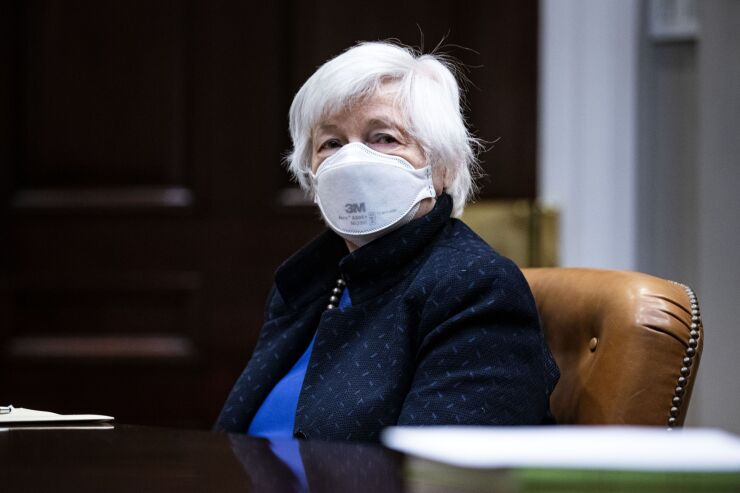Want unlimited access to top ideas and insights?
U.S Treasury Secretary Janet Yellen said more guidance on how state and local governments can spend $350 billion from the last round of coronavirus relief is coming.
Yellen made that comment during a House Financial Services Committee hearing on Tuesday, almost two weeks after the American Rescue Plan was signed into the law. The Government Finance Officers Association said states and local governments need more clarity on how to to store the funds, if funds can be used retroactively, used to shore up rainy day funds and what sort of reporting will be required.
“We’re working very hard to sweat through the issues that we need to in order to provide clarity about the purpose of the funds and how they can be used,” Yellen said

The hearing came almost exactly a year after Congress passed the Coronavirus Aid, Relief, and Economic Security Act, or CARES, a $2.2 trillion relief package, that gave $150 billion to states and local governments.
Some lawmakers voiced concern that increased federal spending would lead to inflation following
Federal Reserve Chair Jerome Powell said during the hearing that he expects inflation to increase, but doesn’t expect the effect to be large or persistent. He wouldn’t comment on fiscal policy.
Luke Tilley, chief economist at Wilmington Trust, noted in a commentary that Powell has signaled an intent to keep interest rates low for several years “despite the stronger-than-expected economic recovery thus far and jitters about possible inflation.”
Inflation could be pushed higher in the second half of the year following the recent stimulus bill, Tilley said.
Other economists have said state and local aid was key to a well-functioning economy following passage of the latest relief bill.
According to multiple news reports, President Biden’s infrastructure plan is starting to coalesce. A large infrastructure bill is next on his agenda following passage of the most recent relief bill.
The plan will aim to spend about $400 billion to combat climate change, including $60 billion for infrastructure related to green transit and $46 billion for climate-related research and development, according to news reports.
Municipal bond advocates are
Republicans have been wary of raising taxes, while Democrats have pushed for a climate-focused bill. That bill is likely to go through the budget reconciliation process — a tool Democrats can use to pass legislation by a simple majority in the Senate instead of the usual 60 required to get a bill across the finish line in that chamber.
That tool was created to allow lawmakers to conform tax and spending levels to the levels set in a budget resolution, and can only be used twice this year, having already been used to pass the COVID relief bill earlier this month.
Municipal bond provisions would still stand a chance if they do go that reconciliation route, though it presents an added challenge. A reconciliation bill would require all costs to be incurred within 10 years, which contrasts with bonds that are often outstanding for decades.
Republican opposition to an infrastructure bill reduces the likelihood of a direct pay bond, similar to Build America Bonds, due to the 10-year limit, said Matt Fabian, partner at Municipal Market Analytics, in a report.
“In effect, any BABs issuance permitted by a law passed through budget reconciliation would need to mature (or be subject to mandatory redemption and tax-exempt reoffering) by 2031,” Fabian wrote.
Even if Democrats are able to push direct pay bonds through, control of one or both Houses in the future by Republicans could interfere, he added.
Yellen said Tuesday that the economy was “in crisis.”
“Right now it’s in a crisis due to the pandemic and the rescue package should provide the funding that’s needed to address the pandemic and to relieve the suffering that it’s caused, getting people to the other side of it,” Yellen said. “It’s been deficit funded, there haven’t been tax increases to finance it, but once the economy is strong again, we’re beyond the pandemic, President Biden is likely to propose that we engage in long-term plans to address long-standing investment shortfalls in our economy."
Those investments include infrastructure and climate risk, Yellen said.





